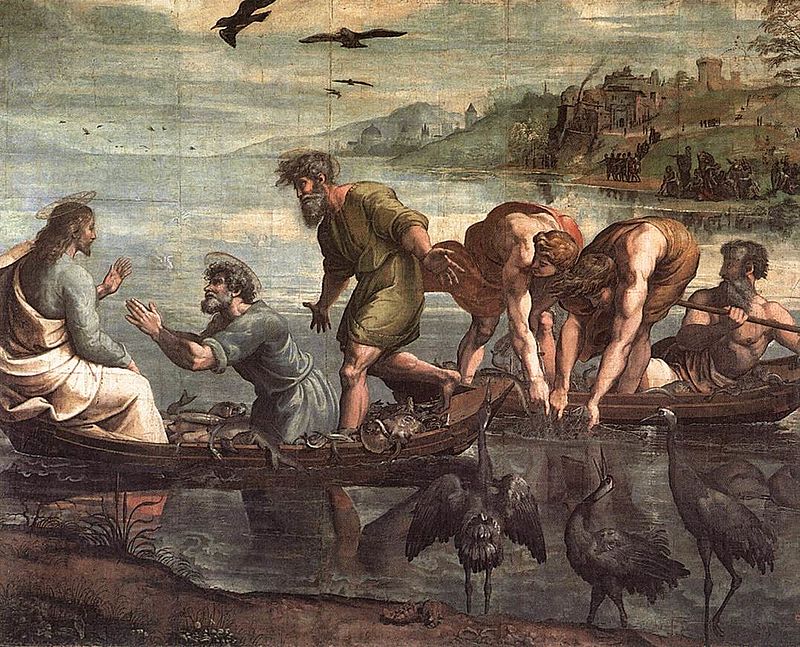Spiritual Sunday
Today I share a poem by my favorite poet when I was growing up. As a romantic teen, I was enthralled by three Alfred Noyes poems in particular: “The Highwayman”(which I had memorized), “Song of Sherwood,” and “The Barrel-Organ.” (Less romantically, I also got a kick out of “When Daddy Fell into the Pond.”)
Noyes’s “Fisher of Men” alludes to today’s Gospel reading (Luke 5:1-11):
Once while Jesus was standing beside the lake of Gennesaret, and the crowd was pressing in on him to hear the word of God, he saw two boats there at the shore of the lake; the fishermen had gone out of them and were washing their nets. He got into one of the boats, the one belonging to Simon, and asked him to put out a little way from the shore. Then he sat down and taught the crowds from the boat. When he had finished speaking, he said to Simon, “Put out into the deep water and let down your nets for a catch.” Simon answered, “Master, we have worked all night long but have caught nothing. Yet if you say so, I will let down the nets.” When they had done this, they caught so many fish that their nets were beginning to break. So they signaled their partners in the other boat to come and help them. And they came and filled both boats, so that they began to sink. But when Simon Peter saw it, he fell down at Jesus’ knees, saying, “Go away from me, Lord, for I am a sinful man!” For he and all who were with him were amazed at the catch of fish that they had taken; and so also were James and John, sons of Zebedee, who were partners with Simon. Then Jesus said to Simon, “Do not be afraid; from now on you will be catching people.” When they had brought their boats to shore, they left everything and followed him.
“The blind welter of war” in “Fishers of Men” refers to World War I, which must have been underway when the poem was written. According to his Wikipedia biography, Noyes was a pacifist who opposed the Boer War and also wrote a long anti-war poem in 1913, hoping to stave off the meaningless slaughter that was to come. (Poetry can do only so much.) He supported the allies in the two world wars, however, believing that, “when threatened by an aggressive and unreasoning enemy, a nation could not but fight.” His “fight for right and not for might” can be read in that context.
Fishers of Men
Long, long ago He said,
He who could wake the dead,
And walk upon the sea–
“Come, follow Me.
“Leave your brown nets and bring
Only your hearts to sing,
Only your souls to pray,
Rise, come away.
“Shake out your spirit-sails,
And brave those wilder gales,
And I will make you then
Fishers of men.”
Was this, then, what He meant?
Was this His high intent,
After two thousand years
Of blood and tears?
God help us, if we fight
For right, and not for might.
God help us if we seek
To shield the weak.
Then, though His heaven be far
From this blind welter of war,
He’ll bless us, on the sea
From Calvary.
Added Note – To give you a sense of what Noyes means by “blood and tears”—he foresaw only too clearly the horrors of World War I—here’s an excerpt from his 1913 anti-war poem The Wine Press:
Slaughter! Slaughter! Slaughter!
The cold machines whirred on.
And strange things crawled amongst the wheat
With entrails dragging round their feet,
And over the foul red shambles
A fearful sunlight shone….
The maxims cracked like cattle-whips
Above the struggling hordes.
They rolled and plunged and writhed like snakes
In the trampled wheat and the blackthorn brakes,
And the lightnings leapt among them
Like clashing crimson swords.
The rifles flogged their wallowing herds,
Flogged them down to die.
Down the the slain the slayers lay,
And the shrapnel thrashed them into clay,
And tossed their limbs like tattered birds
Thro’ a red volcanic sky.


